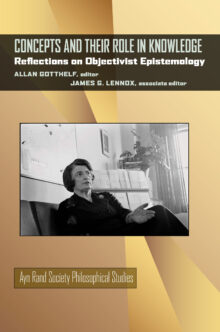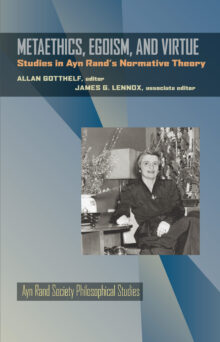
James G. Lennox
James G. Lennox is professor emeritus of history and philosophy of science at the University of Pittsburgh. He has published widely on Aristotle, Charles Darwin, and evolutionary biology. His books include Aristotle: On the Parts of Animals I–IV, a translation and commentary in Oxford’s Clarendon Aristotle Series, Aristotle’s Philosophy of Biology in the Cambridge Studies in Philosophy and Biology Series, Aristotle on Inquiry, and many coedited volumes.
Two Philosophers
Aristotle and Ayn Rand
“If there is a philosophical Atlas who carries the whole of Western civilization on his shoulders,” Ayn Rand wrote, “it is Aristotle. He has been opposed, misinterpreted, misrepresented, and—like an axiom—used by his enemies in the very act of denying him. Whatever intellectual progress men have achieved rests on his achievements.” Such tributes to Aristotle in Rand’s writing have led many readers to study his works. And a number of these, including some of the contributors to this volume, would go on to become scholars of both Aristotle and Rand. It is fitting, then, that there should be an exploration of the relationship between their two philosophies. This volume fosters a deeper appreciation for Ayn Rand’s place in the Aristotelian tradition and in the history of philosophy more generally.
Concepts and Their Role in Knowledge
Reflections on Objectivist Epistemology
Philosopher-novelist Ayn Rand (1905-1982) is a cultural phenomenon. Her books have sold more than twenty-eight million copies, and countless individuals speak of her writings as having significantly influenced their lives. Despite her popularity, Rand’s philosophy of Objectivism has received little serious attention from academic philosophers.
Concepts and Their Role in Knowledge offers scholarly analysis of key elements of Ayn Rand’s radically new approach to epistemology. The four essays, by contributors intimately familiar with this area of her work, discuss Rand’s theory of concepts—including its new account of abstraction and essence—and its central role in her epistemology; how that view leads to a distinctive conception of the justification of knowledge; her realist account of perceptual awareness and its role in the acquisition of knowledge; and finally, the implications of that theory for understanding the growth of scientific knowledge. The volume concludes with critical commentary on the essays by distinguished philosophers with differing philosophical viewpoints and the author’s responses to those commentaries.
This is the second book published in Ayn Rand Society Philosophical Studies, which was developed in conjunction with the Ayn Rand Society to offer a fuller scholarly understanding of this highly original and influential thinker. The Ayn Rand Society, an affiliated group of the American Philosophical Association, Eastern Division, seeks to foster scholarly study by philosophers of the philosophical thought and writings of Ayn Rand.
Metaethics, Egoism, and Virtue
Studies in Ayn Rand's Normative Theory
Philosopher-novelist Ayn Rand (1905–1982) is a cultural phenomenon. Her books have sold more than 25 million copies, and countless individuals speak of her writings as having significantly influenced their lives. In spite of the popular interest in her ideas, or perhaps because of it, RandÆs work has until recently received little serious attention from academics. Though best known among philosophers for her strong support of egoism in ethics and capitalism in politics, there is an increasingly widespread awareness of both the range and the systematic character of RandÆs philosophic thought. This new series, developed in conjunction with the Ayn Rand Society, an affiliated group of the American Philosophical Association, Eastern Division, seeks a fuller scholarly understanding of this highly original and influential thinker.The first volume starts not with the metaphysical and epistemological fundamentals of RandÆs thought, but with central aspects of her ethical theory. Though her endorsement of ethical egoism is well-known—one of her most familiar essay collections is The Virtue of Selfishness—the character of her egoism is not. The chapters in this volume address the basis of her egoism in a virtue-centered normative ethics; her account of how moral norms in general are themselves based on a fundamental choice by an agent to value his own life; and how her own approach to the foundations of ethics is to be compared and contrasted with familiar approaches in the analytic ethical tradition. Philosophers interested in the objectivity of value, in the way ethical theory is (and is not) virtue-based, and in acquiring a serious understanding of an egoistic moral theory worthy of attention will find much to consider in this volume, which includes critical responses to several of its main essays.



